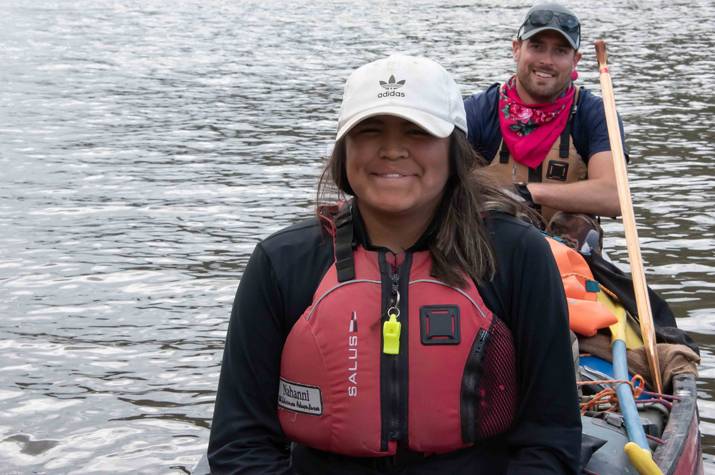Canoe trip reconnects First Nations youth with ancestral land and culture
By Meagan Massad

The 14-day Youth of the Yukon canoe trip gave First Nations communities and the RCMP the opportunity to foster new relationships in the great outdoors.
Image by Andrea Magee
August 1, 2024
Content
RCMP in Alberta are hoping to move forward with a plan to use drones to help support police officers en route to active calls for service. The decision comes after a series of successful test flights held last spring in three Alberta communities.
"Drones are exploding in the RCMP and policing in general," says Paul Bruce, the manager for the drone program at the RCMP's Air Services Branch. "All around the world, law enforcement are using drones for responding to calls, collecting evidence, search and rescue, emergency response, and even in day-to-day policing."
Bruce says the RCMP uses them in all these ways and more, and the list grows every day. The latest addition is the Drone as a First Responder (DFR) pilot project.
"DFR is unique in that we pre-position drones on a rooftop in a community where we're policing, and as a call comes in we send the drone," says Bruce. "We've never done that before. Drones have always been a secondary service."
RCMP tested the drones—referred to as Remotely Piloted Aircraft Systems (RPAS)— in the communities of Lac La Biche, Red Deer, and Stoney Nakoda First Nation. During the pilot RPAS were dispatched to calls on suspicious persons, assaults, fire, and an explosion.
"We know it works, we know it was successful and added to our officers' situational awareness and public safety," says Bruce. "And, we know it can be an efficient, cost-effective way to provide air support that's usually reserved for helicopters and fixed-wing aircraft."
Tech talk
Before testing could begin, RCMP "nested" each drone inside a drone box on a building rooftop within each patrol area. The nests came equipped with weather station technology that ensures weather conditions are safe for flight. When all systems are a go, the drone is brought to life by a pilot from inside a command centre at a nearby RCMP detachment.
Using an internet connection inside the command centre, the pilot uses the drone's live video feed to gather information about the scene and relays it to the responding officer in real time.
According to requirements set out by Transport Canada, a visual observer must also be physically present within 3.2 kilometres of the drone to see the airspace around it at all times and prevent interference with other objects.
Operational game-changer
Constable Anthony Setlack was the chief pilot for multiple sites during the testing, and on the steering committee for the project. He says he saw the benefits of DFR first hand while operating the device from a command centre in the patrol area.
During one particular call Setlack flew the drone to the scene where a person was refusing to leave a homeless shelter. Though he himself was approximately 1.5 kilometres away from the scene, he manoeuvred the drone close enough to zoom in and see pertinent details about the person of interest, as police made their way to the scene.
"I could see his hands, I could see they were empty, I could see no weapons. I could see—in his body movements—his demeanor. And so, I was able to report that back to the officers that were responding," says Setlack. "We were able to help that officer conduct a better risk assessment going into the call. Normally, you get those updates through our telecommunications [operators] where there's a bit of a delay. So, having that live instant feedback to the officers on the ground was a huge game-changer for us."
Setlack says the zoom function on the drones also means there's less chance of escalating a situation.
"I was flying probably 250, 350 feet off the ground and probably 400 to 500 metres away from him, so he wouldn't have heard the RPAS; probably didn't know it was there," says Setlack.
Protecting privacy
Ahead of the pilot, privacy concerns were top of mind during the months-long consultation process with each of the communities, which were chosen as samples of varying sizes, population densities, and access, to determine where RPAS could be used most efficiently. But project organizers put fears to rest, according to Inspector Corey Blize, who is in charge of Air Services in Alberta.
"We do not record unless there's an operational necessity for evidence purposes," says Blize. "So, flying to a call for service we're not recording and the camera is facing the horizon."
Blize says that while the proof of concept for DFR was a success, there are still many details to iron out before RCMP Air Services moves forward with implementation, including which drone technology to purchase and funding.
"[We] proved we could do it successfully, so now it's how do we go further," says Blize. "I do see it coming in the future here; how big and how fast I don't know yet."